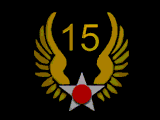|
|
1st William T. Just
721st Squadron
This story is a report of a mission by 1st Lt. William Theodore Just
I arrived at the 450th group air base in Manduria, Italy in late April 1944 as co-pilot on Jim
Daniel’s crew.
We had brought over a new B-24 that had been picked up in Topeka, Kansas.
My first mission was a rough trip to Ploesti, Romania but the next four missions were routine and
uneventful. Before my sixth mission, I was re-assigned as co-pilot on Vic Hollander's crew.
On this trip, the group's mission was to bomb a railroad marshalling yard in Wiener Neustadt,
Austria. As we approached the target at an altitude of about 22,000 feet, we encountered heavy
anti-aircraft flak and German fighters. Our plane was hit hard and we lost the ability to open the
bomb bay doors, making it necessary to [manually] drop our bombs through the [other bomb
bay] doors. We also discovered that we lost all control of our rudders and part of our elevators.
It took the strength of both the pilot and myself holding the wheel to keep the nose of the plane
up.
As we were leaving the target area, I found out that my oxygen supply had been cut and I was
getting faint. The engineer helped me out with walk-around bottles until we could drop down to a
lower altitude where we could breathe without oxygen masks. Obviously we could no longer
stay in the group formation. Two of the P-38's escorting the mission saw our predicament and
stayed with us awhile until they had to leave. Although we were kind of a "sitting duck" for
German fighters, by now we were far enough away from the target area that none came after us.
We still had the problem with our elevator control. Because our hands could not hold the wheel
very long, we managed by taking turns on the wheel and wrapping our forearms around it.
Now the problem was where to go. Our engines were all running okay, but we wondered how
long they would go considering other damage. We knew there was a small island - Vis - in the
middle of the Adriatic Sea that was under Allied control. There was a landing strip on it. But of
course we could not attempt a normal landing. We had hoped to be able to parachute out near
there.
Going down the Yugoslavia coast was good until we came over the city of Split. There
anti-aircraft fire hit us hard as we were at about 11,000 feet. We lost the number four engine and
received other damage including a piece of flak that hit my side of the plane and took out all of
my instrument panel.
At this time Vic gave the order to bail out which was hardly necessary as the crew was already
leaving and would come down on the mainland. With the problem of our elevators, we knew the
plane would pitch into a dive as soon as the wheel was released. The B-24's had a heavy strap
used to lock the controls when the plane was parked on a ramp. We ripped it loose and tied up
the wheel hoping it would hold long enough for us to jump out. When this was done, Vic told me
to jump and he would follow. But when I got down to the bomb bay I could see that we drifted
away from land and were over water coming upon an island off the coast. I went back to tell this
to Vic, and we steered over the island named Brac, about three miles wide and twenty miles
long.
Then I went out, immediately popped my chute, and watched anxiously as the plane went
into a spin. It was about halfway to the ground before Vic was able to get out. He hit the ground
before I did, landing on a slope and tumbled down. I landed unhurt and ran down to see if he was
okay. His shoulder and neck had been hurt opening his chute, but otherwise [he] was okay.
Within a few minutes after reaching Vic, a little old man ran up to us and pointed to the end of
the island saying, "Germans, Germans'' and beckoned us to follow him. He led us to a little kind
of a stone shelter in a field fearing the Germans might come looking for us. Later in the day he
led us down to a village where we met other people including some that could speak English.
Fortunately, we landed with a group of Tito partisans who were friendly to Americans and looked
at Vic and I as kind of heroes. They confirmed the presence of a German garrison, but we never
learned a reason for them to be there as it did not appear anything of military value was on the
island. We moved around the island at various times of the day to avoid contact with any
Germans.
One time we moved at night in a small rowboat. People seemed to know when we
would be entering a village and we were greeted by cheers and "Viva Americanos”. Somehow
word of our presence on Brac got to U.S. Forces in Vis and after about a week on Brac, a boat
was sent over to pick us up on a night rendezvous. We spent one night on Vis and [then] were
sent to 15th Air Force Headquarters in Bari [Italy]. After a night there, I was returned to
Manduria. Vic was kept a couple days at a hospital to treat his shoulder and neck. Back on our
base we learned that Vic and I were given up as dead or MIA as people told us that the group lost
8 planes on the mission.
|
Information courtesy of James C. Just, nephew of 1stLt. William Just.
Link to Crew Information
Link to Obituary Notice
|



